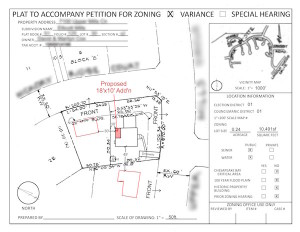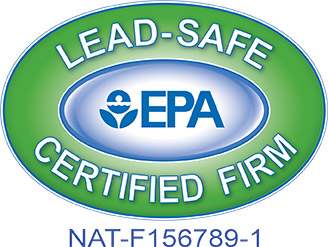Today I’m writing on a topic that can be rather confusing, but very important in the process of some addition projects: variances. Variances are definitely not the most glamorous of subjects, but they make all the difference in the overall chances of getting your addition built if your county deems one necessary.
WHAT EXACTLY IS A VARIANCE?
Before we get into the nitty gritty of variances, let’s define what they are in the first place. Freeadvice.com defines a variance as “…a request to deviate from current zoning requirements. If granted, it permits the owner to use his/her land in a way that is ordinarily not permitted by the zoning ordinance. It is not a change in the zoning law, but a waiver from the requirements of the zoning ordinance”.
In layman’s terms? It is a request that goes through the county to allow you to build your addition (driveway, etc.) on the outer limits of your property, where building is typically not permitted. You see, in order to obtain a permit, pass inspections, and avoid fines, you have to build within the allowed zones designated by the county (even on your own property). A variance gives you an exception to the rule.
HOW DO I KNOW IF I NEED ONE?
When you bought your house, you were probably given a piece of paper that showed the shape of your house sitting on the outline of your property. That’s called a site plan or plot plan. The site plan will typically show the building restriction lines as they pertain to your specific zoning.
If it doesn’t, call your county’s zoning office and ask them – they’ll have the information you need in their records.
IF I NEED A VARIANCE, HOW DO I GET ONE?
Each state (and the counties therein) have different processes for obtaining a variance. In most cases, it involves an application process which includes a portion of the development plat (your house and the few around you – see below for an example). Most counties then require a tedious process that involves posting a sign on your property to notify neighbors of your intentions. Then there is a zoning committee hearing where you explain why you should be granted this variance. You may bring neighbors who support your application; you might find neighbors who are there to argue against (start baking that friendship bread now!).
 CRITERIA FOR OBTAINING A VARIANCE
CRITERIA FOR OBTAINING A VARIANCE
The county can’t approve your variance request based on circumstances. What I mean by that is this: you won’t win a variance by citing the size of your family in comparison to the size of your house. You also won’t win a variance because your Mom is coming to live with you in her golden years and needs her own space. The county doesn’t grant variances based on the personal circumstances surrounding the request.
What the county needs in order to give you the variance is a legitimate request based on special conditions within the lot itself. This type of special condition usually has something to do with the physical configuration of the lot and the structure built on it. An example of a legitimate request would be this: “my home is situated on the corner and has a taper to the rear that cuts off any practical expansion, unlike the more squared off properties of this area.” This is a request the county can work with in getting your request approved.
Mercifully, some counties (like Baltimore County) allow for something called an “administrative variance”: same waiting period but, providing none of your neighbors call to object and you meet the criteria, you’re home free.
Working with a builder who understands variances can save you a lot of time and energy. Firstly, your builder will likely try to avoid a variance request by implementing some design changes, such as building off of a different part of the house. And if reworking the design isn’t feasible, your builder can provide crucial insight into the variance request process to give you the best chance of a favorable outcome.

